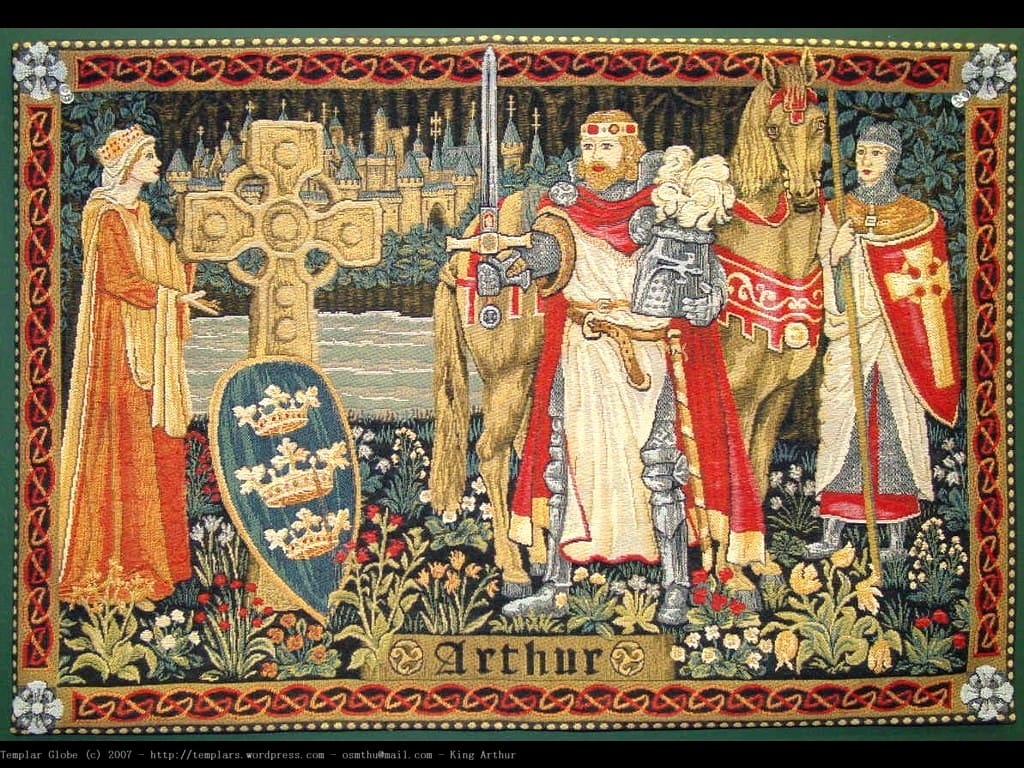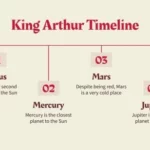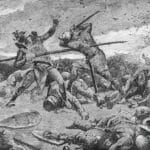The legend of King Arthur, the valiant ruler of Camelot, has enthralled generations with tales of chivalry, magic, and heroic deeds. But did this iconic figure exist beyond the pages of medieval romances? And if so, could his story be interwoven with the mighty Roman Empire that once held sway over Britain? Join us as we delve into the historical enigma of King Arthur and his possible Roman connections.
King Arthur and the Romans: A Complex Relationship
The very existence of King Arthur remains a subject of debate among historians. While he is a prominent figure in medieval literature, concrete evidence supporting his historicity is scarce. Early accounts of Arthur, appearing centuries after his supposed lifetime, often blur the line between fact and fiction. Some scholars propose that the legendary Arthur is an amalgamation of multiple historical figures, blending the deeds of a brave Scottish prince, a skilled Roman general, and an inspiring British king.
Geoffrey of Monmouth’s “Historia Regum Britanniae,” a 12th-century chronicle, played a pivotal role in popularizing the Arthurian legend. While entertaining, Monmouth’s work embellishes history with fantastical elements, making it challenging to separate historical fact from literary invention.
Despite the uncertainty surrounding Arthur’s existence, tantalizing links connect his world to the Roman presence in Britain. The Battle of Mount Badon, a decisive victory against Saxon invaders attributed to Arthur, might be rooted in a historical engagement potentially led by a Romano-British commander.
Furthermore, archaeological discoveries across Britain, including Roman settlements and forts in Cornwall, a region closely associated with Arthurian lore, suggest a possible Roman influence on the legendary narrative. These remnants of Rome’s presence in Britain could have sparked some of the tales woven into the Arthurian world, hinting at a complex historical backdrop.
Was King Arthur Roman?
The possibility of King Arthur having direct ties to the Roman Empire adds another layer of intrigue to his enigmatic story. Early chronicles, like the “Historia Brittonum,” depict Arthur as a “dux bellorum” – a Roman military leader. This portrayal, likely originating from a time when Roman influence was still respected in Britain, suggests a nuanced relationship between the Britons and their former rulers.
Interestingly, as time progressed, the Arthurian narrative shifted. Arthur transformed from a Roman-affiliated figure into the quintessential British champion, resisting Roman rule. This evolution in his portrayal might reflect changing British attitudes toward Rome – a transition from acceptance to a yearning for independence and a distinct British identity.
Arthur’s connection to Rome, whether real or fictionalized, offers a glimpse into the complex historical dynamics of Britain during a period of significant transformation. The presence of Roman elements within Arthurian legends highlights the indelible mark left by Roman civilization on British culture. Moreover, depicting Arthur as a Roman military leader could signify a desire among some Britons for coexistence or even integration with their former imperial power.
The Name “Arthur”: Echoes of Roman Britain
The name “Arthur” itself might hold clues to the legendary king’s possible Roman connections. It likely originated from the Roman nomen (family name) “Artorius,” a common name in Roman Britain during the 2nd and 3rd centuries AD. The prevalence of “Artorius” in inscriptions and records from Roman Britain suggests its adoption by Roman citizens and auxiliary soldiers stationed throughout the province.
Adding to the intrigue, some historians propose a link between the legendary Arthur and a historical figure named Riothamus, a 5th-century British leader who challenged Roman authority. This theory posits that Riothamus might have also been known by the Romanized name “Arturius,” drawing a direct connection between a documented historical figure and the legendary king.
Regardless of the Riothamus connection, the name “Arthur” gained significant traction in early 6th-century Britain. Notable individuals, including a bishop and even a king, bore the name, highlighting its popularity and esteemed status.
Therefore, the name “Arthur” might represent more than just a legendary king. It could symbolize the lingering legacy of Roman Britain and the intricate cultural exchange between the Britons and their former rulers. The name serves as a reminder of the indelible impact Roman civilization had on British society, even centuries after Rome’s legions departed.
Arthur as a Roman Military Leader: Separating Fact from Fiction
While the possibility of King Arthur being a Roman military leader is captivating, it remains within the realm of speculation. Historical sources are sparse and often contradictory, making it challenging to definitively confirm or deny Arthur’s historicity.
Was Arthur Real?
Some historians point to scant historical evidence suggesting Arthur might have been a real figure – a valiant warrior or a leader with Roman connections who defended Britain against Saxon incursions during the 5th or 6th century. This time frame aligns with the period when Arthur would have lived if he existed. However, without concrete archaeological or historical proof, the debate about Arthur’s existence continues.
The Roman Connection
The name “Arthur,” potentially derived from the Roman “Artorius,” further fuels speculation about his Roman ties. During Rome’s rule over Britain, “Artorius” was a prevalent family name, and the historical figure Riothamus, potentially also known as Arturius, adds another layer of intrigue. However, these connections remain circumstantial, open to interpretation.
Arthur’s Enduring Legacy
Regardless of his historical authenticity, King Arthur embodies the spirit of Britain, symbolizing courage, unity, and resilience in the face of adversity. His legend, a captivating blend of historical events and imaginative storytelling, has captivated audiences for centuries. Arthur’s impact transcends the limitations of historical accuracy; he represents the enduring power of storytelling and the universal appeal of heroism.
While we may never definitively unravel the mystery surrounding King Arthur’s existence or his purported Roman connections, his story continues to fascinate and inspire. The legend of King Arthur, forever intertwined with the history and mythology of Britain, reminds us of the enduring power of stories to shape our understanding of the past and ignite our imaginations.
To further explore the captivating world of King Arthur, check out these insightful resources:
- King Arthur Timeline: Embark on a chronological journey through the life and times of King Arthur, tracing the pivotal events that shaped his legendary reign.
- King Arthur and the Saxons: Delve into the tumultuous relationship between King Arthur and the Saxons, a defining chapter in British history that significantly influenced Arthur’s legend.
- Geoffrey of Monmouth’s Historia Regum Britanniae (1136): Immerse yourself in one of the earliest and most influential accounts of King Arthur’s life, a captivating blend of history, legend, and literary embellishment.
- Unlock Filipino Culture: A Deep Dive into Traditions and Practices - April 23, 2025
- Unlock Spanish Culture: Insights & Opportunities Now - April 23, 2025
- White Spirit Uses & Substitutes: A Deep Dive for Pros & DIYers - April 23, 2025
















